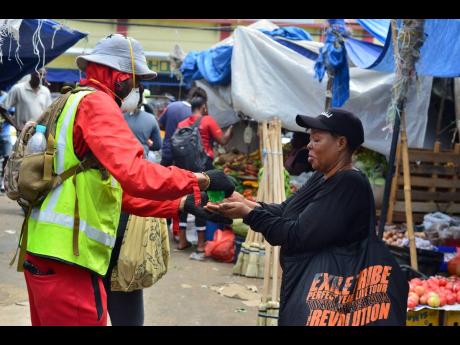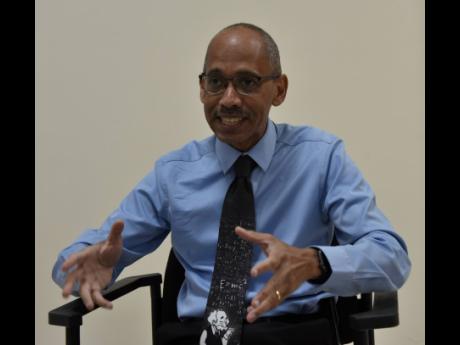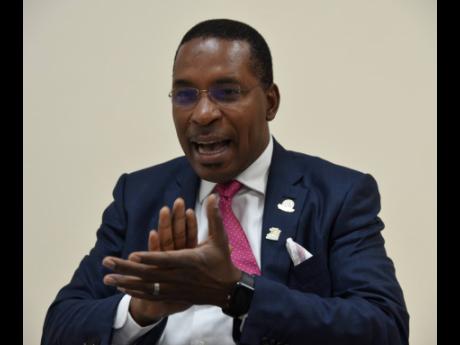Bigger than 9/11 - COVID-19 will change how medicine is practised, say doctors
One of the country’s brightest medical minds, Professor Michael Boyne, believes that the crippling fear and death associated with the coronavirus disease 2019 (COVID-19) is comparable only to the terror attack of September 11, 2001 in the United States, which resonated around the world, leaving behind a tidal wave of dread and forever changed flying protocol.
Boyne, who is head of the Department of Medicine at The University Hospital of the West Indies (UHWI), said COVID-19 is not undefeatable, but the way medicine is practised will never be the same.
“This is a humongous test to the way we practise medicine going forward. We have had other challenges and fears, but nothing like this. When Ebola broke out a few years ago, UHWI and National Chest Hospital were prepared for it, but it never came. We’ve had malaria in the past and other mosquito-borne infections. Today, malaria no longer exists, and we are still struggling with dengue. But I suspect COVID-19 is a game changer. What I have told my staff is that, just as they remember 9/11 very well, 3/10 is a game changer,” he told The Sunday Gleaner.
On March 10, Jamaica recorded its first confirmed case of COVID-19. In less than a month, the country now has 55 confirmed cases, with three deaths. Seven persons have recovered.
Globally, COVID-19 has infected practically all countries, with approximately 1,159,515 confirmed cases, and an estimated 62,375 deaths. So far, approximately 225,066 persons have recovered.
SIGNIFIED GREAT STRUGGLE
Explaining the comparison with the September 11, 2001 terrorist attack in the US and COVID-19, Professor Boyne said, “What I mean by that is that it was a momentous enough occasion that probably signified great struggle. Our lives will not return to the way they were post-3/10 (March 10). Because of the infectious nature of this new virus, because it spreads like influenza, it makes it much more difficult to contain, unless we do what is already recommended by the Ministry of Health.”
To the best of his recollection, neither the 1950s nor 1990s polio outbreak carried the crippling fear factor and behaviour changes required for COVID-19.
“I have never seen this level of fear before among the population. 9/11 was the closest thing in my memory that I can think about. The changes that have been required to our lives are also the greatest I can think of since 9/11, and that was only if you are flying. The changes required for COVID-19 are now every part of our lives, whether you are a schoolchild or an elderly person,” Boyne noted.
Continuing, he said: “What it means for us in the health profession is that things are not business as usual. It forces us to re-engineer everything we are doing. The way we see patients, the way we communicate and the way we do procedures.”
The medical profession, he said, was still learning about COVID-19.
“There is still more that we are learning, and among us there are disagreements. So the novelty, anxiety, uncertainty and fear that these services will be overwhelmed. So many things make this the greatest threat that I can think of, certainly in my life,” said the nearly 30-year medical veteran.
Boyne, an endocrinologist, said since Jamaica had its first confirmed case of the respiratory disease, he has spent nearly all his waking hours being part of the mobilising efforts and empowering members of staff to deal with the disease.
HERD IMMUNITY
Dr Carl Bruce, medical chief of staff at UHWI, shares similar views.
“This disease is the one, certainly in my lifetime, that has garnered the most attention, and certainly because of the mortality associated with it. It’s not that we have not seen more infectious diseases before – we have seen more dangerous infectious diseases, such as Ebola that has over 40 per cent mortality – but it never hit our shores. This is on our shore. This one is real. This one is associated with significant morbidity. And, therefore, from the perspective of managing the unknown, it has to be one of the greatest challenges that the university has seen since we have opened here at the Papine Estate,” Bruce admitted.
Full population exposure – herd immunity – or vaccinations may be the answer, he said.
“COVID-19 has required more social distancing because of the way it is spread, whether by contact or droplets, therefore, public-health teams have been challenged by the way it is spread. But because of our tradition of managing highly infectious diseases, like Ebola, public-health teams will develop some type of immunity,” he explained.
Bruce believes that COVID-19 will have a lifetime impact on the healthcare system.
“It will certainly have an impact on the way we practise medicine, how we protect patients from ourselves, how we isolate and how we design healthcare facilities and infrastructure, to ensure that when emerging diseases take place, we are actually prepared for them,” he stated.









